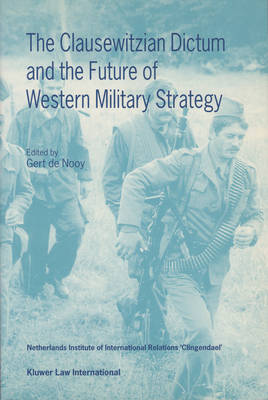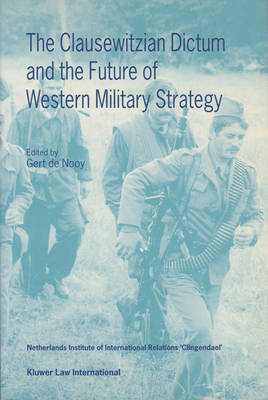
- Retrait gratuit dans votre magasin Club
- 7.000.000 titres dans notre catalogue
- Payer en toute sécurité
- Toujours un magasin près de chez vous
- Retrait gratuit dans votre magasin Club
- 7.000.0000 titres dans notre catalogue
- Payer en toute sécurité
- Toujours un magasin près de chez vous
The Clausewitzian Dictum and the Future of Western Military Strategy
218,45 €
+ 436 points
Description
This book aims at defining a rationale for the continued use of military armed force(s) by states. Central to this publication are the answers to fundamental questions pertaining to the convention of war, as formulated by Martin van Creveld: `to define just who is allowed to kill whom, for what ends, under what circumstances, and by what means'. Above all, the authors take into account developments and trends within the elements of the Clausewitzian trinity supporting the Westphalian nation-state: `The People (or the Society)', `The Government' and 'The Armed Forces (or The Military)'.
The change in the Atlantic-European security environment, and the effects that this will have on the form and content of national and multilateral security strategies and doctrines, form the background to this publication. Moreover, the possible impact of societal changes on West European states, as a consequence of European integration, are analysed and discussed. Finally, the consequences of 'out-of-area' and police-type functions for armed forces in addition to the classical defence role are related to the size and composition of future forces.
First, in Chapters Two (Martin van Creveld) and Three (Jan Geert Siccama), the Clausewitzian dictum, trinitarian theory, and the - absence of - alternative theories of warfare are discussed. Next, Chapters Four (Zeev Maoz) and Five (Jan van der Meulen) deal with societal changes and trends within Western Society at large which affect the future use of armed forces. Chapters Six (Koen Koch) and Seven (Jaap de Wilde) concentrate on the future relevance of the nation-state and the governing bodies in relation to the ongoing process of European political integration and multilateralization of diplomatic interaction. Chapters Eight (Jan Willem Honig), Nine (Kees Homan), and Ten (Robert Bunker) address how present-day changes and trends affect the armed forces. Respectively, the authors address issues relating to military strategy, personnel, and technology. Finally, Chapter Eleven (Gert de Nooy and Rienk Terpstra) provides an overview of topical highlights and tentative conclusions emanating from both the chapters and the discussions held during the workshop held in conjunction with this book.
This book will be of interest to European policy-makers, defence planners, officers-under-training in military and defence academies, and students of international relations, political science and security.
The change in the Atlantic-European security environment, and the effects that this will have on the form and content of national and multilateral security strategies and doctrines, form the background to this publication. Moreover, the possible impact of societal changes on West European states, as a consequence of European integration, are analysed and discussed. Finally, the consequences of 'out-of-area' and police-type functions for armed forces in addition to the classical defence role are related to the size and composition of future forces.
First, in Chapters Two (Martin van Creveld) and Three (Jan Geert Siccama), the Clausewitzian dictum, trinitarian theory, and the - absence of - alternative theories of warfare are discussed. Next, Chapters Four (Zeev Maoz) and Five (Jan van der Meulen) deal with societal changes and trends within Western Society at large which affect the future use of armed forces. Chapters Six (Koen Koch) and Seven (Jaap de Wilde) concentrate on the future relevance of the nation-state and the governing bodies in relation to the ongoing process of European political integration and multilateralization of diplomatic interaction. Chapters Eight (Jan Willem Honig), Nine (Kees Homan), and Ten (Robert Bunker) address how present-day changes and trends affect the armed forces. Respectively, the authors address issues relating to military strategy, personnel, and technology. Finally, Chapter Eleven (Gert de Nooy and Rienk Terpstra) provides an overview of topical highlights and tentative conclusions emanating from both the chapters and the discussions held during the workshop held in conjunction with this book.
This book will be of interest to European policy-makers, defence planners, officers-under-training in military and defence academies, and students of international relations, political science and security.
Spécifications
Parties prenantes
- Editeur:
Contenu
- Nombre de pages :
- 192
- Langue:
- Anglais
- Collection :
- Tome:
- n° 31
Caractéristiques
- EAN:
- 9789041104557
- Date de parution :
- 01-09-97
- Format:
- Livre relié
- Format numérique:
- Ongenaaid / garenloos gebonden
- Dimensions :
- 156 mm x 247 mm
- Poids :
- 308 g

Les avis
Nous publions uniquement les avis qui respectent les conditions requises. Consultez nos conditions pour les avis.





